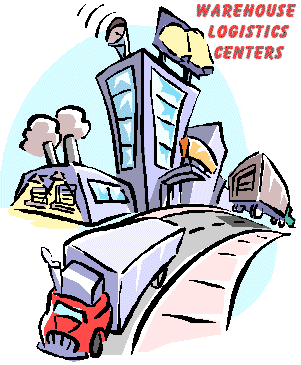|
||
| WMS Systems Integration | ||
| Logistics and the Application of a WMS (Warehouse Management System) | ||
| Logistics is the management of materials, inventory and products in motion and at rest. Three main elements of logistics are materials management, material flow system, and physical distribution. Materials management involves the procurement and receiving of raw materials or unfinished products (inbound transportation and warehousing). The goal of a material flow system is the ability to locate and schedule product through the finishing stages (inventory management, information network design, product marking, labeling and packaging). Physical distribution is the delivery of finished goods to customers (outbound transportation, cross docking, traffic management/fleet operations, freight consolidation, merge-in-transit, and product returns/repairs). | ||
 |
Logistics is becoming an increasingly attractive approach to creating superior customer value. Logistics embodies the key components of customer service for most companies, which are delivery speed, dependability, flexibility and responsiveness. Delivery speed is increasing as logistics is evolving into a continuous flow process. Traditional distribution centers, transportation hubs, and consolidation centers are being bypassed as material and products remain in constant motion from source to final destination. The constant motion coupled with scheduling is creating the notion of a "pipeline" (in-motion warehouse) whereby a regulated flow of material and product is received at the right place at the right time (similar to Just in Time principles) reducing inventory carrying costs. Logistics enables customer responsiveness to be realized by accommodating pull strategies. As customer demand increases, the flow regulation can be adjusted to increase supply when needed. As logistics continues to streamline its operations, remove unnecessary steps and integrate information systems, a company’s marketing quality (speed of delivery, dependability of arrival) is enhanced and costs are reduced which ultimately maximize customer satisfaction. | |
| The role of the WMS (Warehouse Management System) is to support the logistics processes. It models solutions based on constraints within the warehouse configuration and inventory system. Its goal is to find the optimal solution to constraints that form within the inventory system. The most frequent tools are inbound and outbound inventory scheduling optimization. As the logistics function continues to trade inventory for information, WMS software allows for "shipment visibility" within the "in-motion warehouse" or pipeline because of its real time tracking capabilities. Today’s WMS is far more than a simple warehouse facility management system. | ||
| The Case For Utilizing Connected Concepts LLC. | ||
|
The key to success in applying a WMS system is moving past the narrow focus that
buying a software package is the solution. A company must broadening their perspective to
recognize that they have to have well designed business processes, a properly matched
system, and good people to really get their desired results.
WMS project integration and management draws heavily on the knowledge and experience of consultants, like Connected Concepts. For our part, we, as the consultant / integrators, take responsibility for coordinating and interfacing the WMS's operations with the distribution center's radio-frequency systems, bar-code scanners, and printers and ensuring smooth data exchange with the other systems and applications used in the business. As Integrators, we often must develop the interfaces between the WMS and those software applications and then test the entire system. In addition, Connected Concepts frequently provides employee training and writes the reference documentation. Finally, Connected Concepts helps our clients to evaluate, and change their existing business practices to ensure that the software produces the most effective results. |
 |
|
|
Only a few years ago, a WMS installation didn't require a systems integrator's
services. In the industry's infancy, most WMS vendors were heavily involved in their
packages' implementation. The software developers often perfected their applications at
the customer's site, changing lines of code to fix unforeseen problems. As the industry
has matured, most WMS suppliers have shifted their focus to package sales, leaving the
installation work to others.
Besides providing manpower for WMS installations, Connected Concepts adds value by bringing more depth of skills to a project. These systems are so sophisticated, with the RF devices and different forms of bar-code readers, that clients need one integrated approach for their business. Initially most WMS integration was shifted from the software developers to materials-handling consultants. More recently, there's been a transition from materials-handling consultants to business-management consultants. That has happened because the WMS is no longer viewed as centering only on the warehouse facility, but now is viewed to revolve around the enterprise. |
||
 |
As companies start to realize that WMS software systems can have a tremendous impact outside the warehouse walls; on distribution, sales, and ultimately corporate earnings, many chief executives are beginning to see WMS implementation as an opportunity to examine the entire supply-chain operation. As part of the WMS implementation project, management consultants, like Connected Concepts, examine the client’s business processes. We then propose distribution and warehousing operational changes to take advantage of the software's capabilities to bring about supply-chain improvements. Warehouses, or as we now are calling them, warehouse logistics centers, have shifted from being storage facilities to being product transformation centers. In many cases, product is being changed in its form or its package prior to being shipped to its final destination. There always will be an opportunity for a company to provide simple storage services, and those kinds of companies will operate at reduced margins and probably with a reduced opportunity to serve various customers. | |
| The companies that are going to flourish and really be exceptionally successful will provide information-technology-driven value-added services in the years ahead. The warehouse of the future will be a flow-through facility rather than a storage center. In the future, warehouses will move a greater mix of products at higher rates of throughput, especially as companies embrace the concept of cross-docking. Skilled consultants, like Connected Concepts, can look at what's going on inside the your four walls and make recommendations on changing the processes. They'll make the processes better and then add the software to maximize your benefit. Because these WMS projects can involve sweeping organizational change along with the package installation, management consultants, like Connected Concepts, rather than software developers, have the expertise and background to do the whole job. | ||
|
||
| © Connected Concepts LLC.| 5579 B Chamblee Dunwoody Rd. Suite 131| Atlanta GA. 30338 | 770-481-9992 | ||